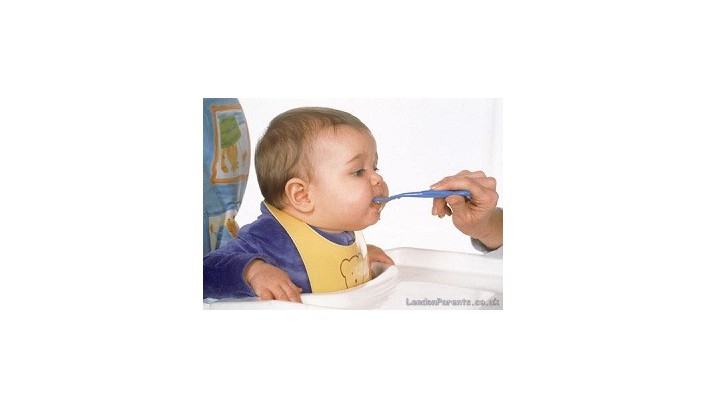Article Categories
News
-
20 July
-
04 November
-
10 July
-
12 June
-
05 June
-
24 September
-
19 September
-
10 May
-
26 April
Website Categories
Weaning. When to start and what with

When to start introducing solid foods
Introducing your baby to solid foods, often called weaning on to foods, should start when your baby is around six months old.
It is a really important step in your baby’s development and can be great fun to explore new flavours and textures together.
To begin with, how much your baby takes is less important than getting them used to the idea of eating.
They will still be getting most of their nutrition from breastmilk or infant formula. Babies don’t need three meals a day to start with, so you can start by offering foods at a time that suits you both.
Gradually you’ll be able to increase the amount and variety of food your baby eats until they can eventually eat the same as the rest of the family, in smaller portions.
Research shows that babies need nothing but breastmilk or infant formula for the first six months of life.
This gives a baby’s digestive system time to develop so that they cope fully with solid foods. This includes solid foods made into purées and cereals mixed with milk.
Why it pays to wait until they are ready
If you are breastfeeding, feeding only your milk up to around six months will give them extra protection against infection, and it will continue to protect them for as long as you carry on.
Whether your baby has breast milk or infant formula, waiting until your baby is ready for food will save a lot of time too, as they will quickly be able to feed themselves and with less mess, as they will be able to swallow properly.
Three signs your baby is ready for their first food
Every baby is an individual, but there are three clear signs which, together, show your baby is ready for solid foods alongside breastmilk or infant formula. It is very rare for these signs to appear together before your baby is six months old.
- They can stay in a sitting position and hold their head steady.
- They can co-ordinate their eyes, hands and mouth so that they can look at the food, pick it up and put it in their mouth, all by themselves.
- They can swallow food. Babies who are not ready will push their food back out, so they get more round their face than they do in their mouths.
Some signs that can be mistaken for a baby being ready for solid foods:
- chewing fists
- waking in the night when they have previously slept through
- wanting extra milk feeds
These are normal behaviours and not necessarily a sign of hunger, or a sign of being ready to start solid food. Starting solid foods won’t make them any more likely to sleep through the night. Extra feeds are usually enough until they’re ready for other food.
Getting started
- Always stay with your baby when they are eating in case they start to choke.
- Let your baby enjoy touching and holding the food.
- Allow your baby to feed themselves, using their fingers, as soon as they show an interest.
- Don’t force your baby, wait until the next time if they are not interested this time.
- If you are using a spoon, wait for your baby to open their mouth before you offer the food. Your baby may like to hold a spoon too.
- Start by offering just a few pieces or teaspoons of food, once a day.
- Cool hot food and test it before giving it to your baby.
- Don’t add salt, sugar or stock cubes to your baby’s food or cooking water.
Tips on what foods to give your baby as they grow
From 0-6 months
Breast milk or infant formula. ‘Follow-on’ formula is not suitable for babies under six months, you don’t need to introduce it after six months either.
Introducing solid foods before six months: if after checking with your health visitor or doctor, you decide to introduce solid foods before six months, you should avoid giving your baby certain foods as they may cause food allergies or make your baby ill. These include foods that contain wheat, gluten, nuts, peanuts, peanut products, seeds, liver, eggs, fish, shellfish, cows’ milk and soft or unpasteurised cheese.
From 6 months
First foods: your baby’s first foods can include mashed or soft cooked fruit and vegetables like parsnip, potato, yam, sweet potato, carrot, apple or pear, all cooled before eating. Or soft fruit like peach, melon, soft ripe banana or avocado as finger foods or mashed. Or baby rice or baby cereal mixed with your baby’s usual milk. Keep feeding them breast milk or infant formula as well but don’t give them whole cows’ milk as a drink until they are a year old.
Next foods: soft cooked meat such as chicken, mashed fish (check very carefully for any bones), pasta, noodles, toast, pieces of chapatti, lentils, rice and mashed hard boiled eggs. Also full-fat dairy products such as yoghurt, fromage frais or custard (choose products with no added sugar or less sugar). Whole cows’ milk can be used in cooking or mixed with food from six months.
Cups: introduce a cup from around six months and offer sips of water with meals. Using an open cup or a free flow cup without a valve will help your baby learn to sip and is better for your baby’s teeth.
From 8-9 months
Gradually, in this time your baby will move toward eating three meals a day. It will be a mixture of soft finger foods, mashed and chopped foods.
Your baby’s diet should consist of a variety of the following types of food: fruit and vegetables; bread, rice, pasta, potatoes and other starchy foods; meat, fish, eggs, beans and other non dairy sources of protein and milk and dairy products.
From 12 months
Your baby will now be eating three meals a day, chopped if required, plus breast milk or whole cows’ milk and healthier snacks like fruit, vegetable sticks, toast and rice cakes.
They can now drink whole cows’ milk. Choose full-fat dairy products because children under two need the extra fat and vitamins found in them. From two years old if they are a good eater and growing well they can have semi-skimmed milk. From five years old 1% fat and skimmed milk is OK.
You can give your baby:
- three to four servings a day of starchy food such as potatoes, bread and rice
- three to four servings a day of fruit and vegetables
- two servings a day of meat, fish, eggs, dhal or other pulses (beans and lentils)
What milk when?
For around the first six months you should feed your baby only breast milk or infant formula. Only use soya-based infant formula if your GP has advised you to. Follow-on milks are available for babies over six months but there is no need to change over to these. Cows’ milk can be mixed with food from six months and whole cows’ milk can be given as a drink from one year.
Infant formula, follow-on formula or growing-up milks are not needed once your baby is 12 months old. Goats' and sheep’s milk are not suitable as a drink for babies under one year and rice drink is not suitable as a drink for children under the age of five.
Related articles
EPIC GLOBAL PRESCHOOL, ODYSSEY, COMING T...
Londonnews554XXXAn award-winning preschool offering from Asia is to open its first campus in London, bringing a new global ‘limitless learning’...
Read moreParenting is no easy task, and for Jordan and Briana Driskell, raising their quintuplets—Zoey, Dakota, Hollyn, Asher, and Gavin&mdash...
Read moreFocus on back to school - include a free...
Emma WallaceThe summer holidays are drawing to a close and September sees pupils heading back to the classroom. Alongside buying new uniform and statio...
Read more0 comments
No messages yet




